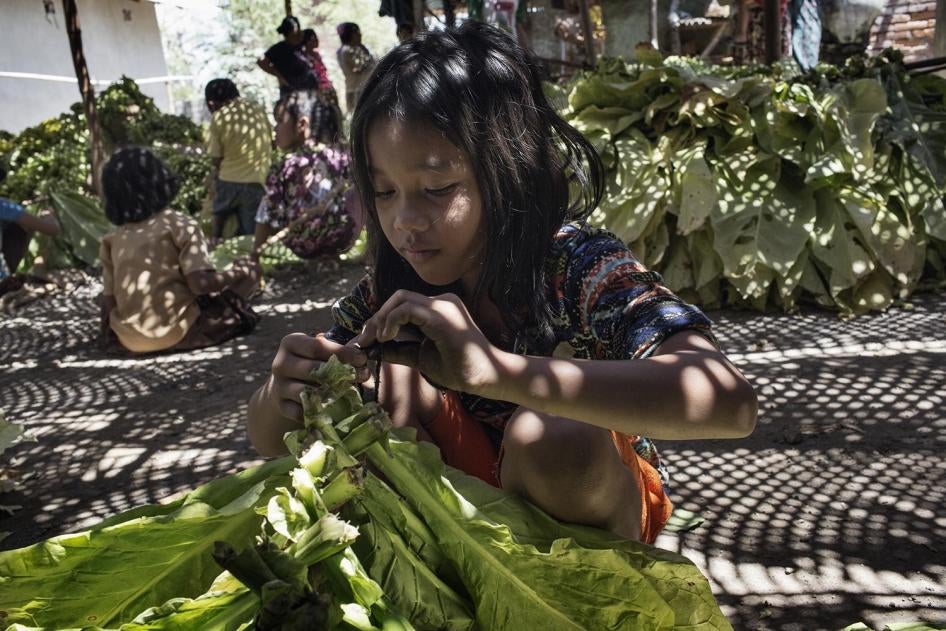Many of the world’s most popular brands of cigarettes may contain tobacco produced by vulnerable child workers. Over the last five years, we have investigated labor conditions and human rights problems on tobacco farms in four of the world’s top 10 tobacco-producing countries. We found that children work in hazardous conditions on farms supplying some of the world’s largest multinational tobacco companies.
In the United States, the world’s fourth-largest tobacco producer, weak labor laws and regulations allow the hiring of children as young as 12 to work unlimited hours on farms of any size – including in tobacco fields – as long as they don’t miss school. Child workers told us about working 12-hour days in extreme heat, topping or harvesting tobacco plants.
Many of them complained of suffering nausea, vomiting, headaches, and dizziness while they worked – all symptoms consistent with acute nicotine poisoning, or green tobacco sickness, from nicotine being absorbed through the skin while handling tobacco. “It felt like there was something in my head trying to eat it,” one 12-year-old worker said, describing the headaches he got while he worked.
Indonesia, the fifth-largest tobacco producer globally, has more than half a million tobacco farms. Most are small, family-run plots, and we found that children often work alongside their parents and neighbors, harvesting and carrying tobacco leaves and preparing them for curing. Many complained that they had the same symptoms. “I threw up so many times,” said one 13-year-old worker.
Most recently, in Zimbabwe, the sixth-largest tobacco producer, we found that both child and adult workers faced serious health risks and labor abuses on tobacco farms. Tobacco is the country’s most valuable export commodity and a pillar of a troubled economy. But we found that some child workers sacrificed their health and education to work on tobacco farms. Though nearly everyone we interviewed had experienced symptoms of nicotine poisoning, almost no one had ever heard of it or knew how to protect themselves. The firms insist they do give training.
The world’s largest multinational tobacco product manufacturers, including the UK giants British American Tobacco (maker of Lucky Strike, Camel, and Dunhill) and Imperial Brands (maker of Davidoff and Gauloises Blondes), source from these and other tobacco-growing countries.
The firms say that they are doing everything they can to end exploitative child labor, stop abuses in their supply chains and have policies to safeguard workers.
Child labor has not been completely eliminated in Brazil, but there has been progress in keeping children out of hazardous work and protecting adult workers.
The contrast between what we found in Brazil, as compared with the US, Indonesia, and Zimbabwe, is striking and suggests that when governments regulate the industry and hold companies accountable, progress can be made. Many of the same companies purchase from all of these markets. The Brazil example shows that strong laws and regulations can help companies take action to reduce child labor and human rights problems.
The incremental changes we’ve seen are encouraging, but it’s hard to keep hearing the same stories of sickness and suffering by child workers on tobacco farms year after year. By next month, the tobacco growing season will be under way in Indonesia and the United States, and in a few months, farmers in Zimbabwe will begin planting next year’s crop. Brazil points to a way forward.
Governments should enact strict regulations and provide extensive health information and training to protect tobacco workers from harm. Tobacco companies should explicitly prohibit children from contact with tobacco in any form, carry out regular and rigorous human rights monitoring in the supply chain, and report transparently on their efforts. The health and wellbeing of child workers all over the world hangs in the balance.
Margaret Wurth and Jane Buchanan are children’s rights experts at Human Rights Watch.









